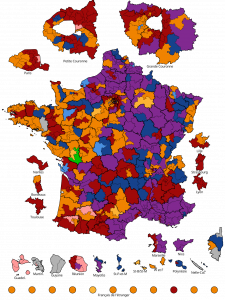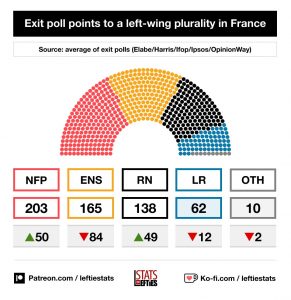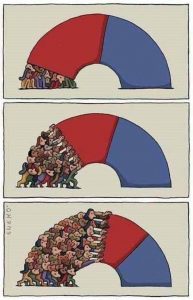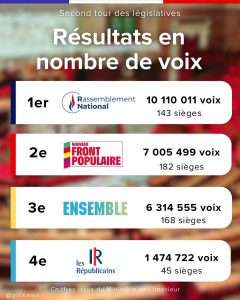Le Nouveau Front Populaire saves France from a fascist takeover
by Pauline Park, Ph.D.
France’s snap parliamentary elections shocked the French as much as they shocked Europe and the world; here are a few important points to consider:
France was after Britain the greatest colonial power of the nineteenth and early twentieth centuries; it is the fifth largest national economy in the world and is both a founding member of the European Union and of the United Nations, where it holds one of the five permanent seats on the Security Council. Though diminished from the days of its vast colonial imperium, France remains one of the leading second tier powers in the world and what happens in France matters not only in Europe but beyond, including in Africa, where it retains neocolonial power in many of its former colonies.
The rise of the Rassemblement National (National Rally) is the most significant development in French politics of the last decade. Charles de Gaulle tried to re-write French history by turning France’s ignominious defeat in World War II and occupation by Nazi Germany into a new status as a victorious power; but the stain of Maréchal Pétain’s collaborationist Vichy régime has not been erased: quite the contrary — the recrudescence of fascism in the form of Jean-Marie LePen’s Front National has brought back the shadow of the past. His daughter Marine LePen ousted her father, took over the Front National and renamed it the Rassemblement National (National Rally), explicitly aiming at the ‘dé-diabolisation’ (de-demonizing) of the extreme right-wing party; but it remains a profoundly fascist party, as evidenced by the incidents of bullying and physical violence perpetrated by RN members during the election period.
Significantly, embrace of Apartheid Israel in conjunction with the RN’s virulent Islamophobia is one of the secrets behind the party’s ‘normalization in French politics. Amichaï Chikli did not wait for the second ballot to endorse Marine LePen and the RN (Sam Sokol and Times of Israel staff, “Amichaï Chikli dit avoir ‘d’excellentes relations avec le RN’ de Marine LePen,” Times of Israel, 9 July 2024). Ha’aretz reported that Israel’s diaspora minister provoked a storm of protest from Israeli diplomats with his endorsement of LePen and his assertion that Benjamin Netanyahu wanted to see the fascist Frenchwoman elected president of France (Amir Tibon, “A Diplomatic Bomb: Israel’s Diaspora Minister Rallied Behind Le Pen and Israeli Diplomats Are Livid,” Ha’aretz via MSN, 8 July 2024).
“Far Right Evils” by Paresh Nath (U.T. Independent, India, 6.29.24)
The RN shocked France and Europe when the party came in first in the European Parliament elections held in early June (ending June 9), prompting Emmanuel Macron to dissolve the Assemblée Nationale (National Assembly) — a huge gamble that shocked even members of the president’s own ‘Renaissance’ party which apparently found out about the decision through the media just like everyone else. The president of the republic scheduled parliamentary elections for June 30 and July 7 and the RN’s triumph in the first found on June 30 seemed to confirm the worst fears of progressives that Macron’s gamble would end up electing the first fascist government since Pétain’s collaborationist Vichy régime. All the polls had predicted that the Rassemblement National (RN) would win at least a plurality and possibly even an absolute majority in the new Assemblée Nationale so the French across all parties were shocked when the RN actually finished third behind the NFP and Macron’s Ensemble; what happened…?
First, Jean-Luc Mélenchon of the progressive party ‘la France Insoumise’ (France Unbowed) and his comrades announced the formation of a ‘le Nouveau Front Populaire’ (NFP) (New Popular Front) — self-consciously namedafter the Front Populaire government led by Léon Blum that was France’s first leftwing government. Macron apparently swallowed his pride and agreed to a pact in which the candidate who came in third in the first round would withdraw in order to give voters in each district a binary choice between the RN candidate and just one opponent —whether Ensemble or NFP; scores of candidates from both groups withdrew, leading to what could well have been the most effective electoral pact in the history of the Fifth French Republic.
Second, enhancing the impact of the electoral pact between NFP and Ensemble, the results of the first ballot generated an exceptionally large voter turnout. And voting surged between the first round and the second after the RN’s first-place finish on the first ballot brought out thousands of voters who feared a fascist triumph; the turnout in the second round reportedly was the largest for any National Assembly election since 1997 — with turnout rising from 46% in 2022 to 67% in the second round on July 7, as projected by pollsters (Adam Nossiter and Aurelian Breeden, “Five Takeaways from France’s Snap Election,” New York Times, 8 July 2024).
The result was divided government of the sort not seen under the Fifth French Republic, founded in 1958. When Charles de Gaulle created the constitution of the Fifth Republic, he did not take into account the possibility that the president of the republic would not have a majority in both houses of parliament — especially the National Assembly — but both François Mitterrand and Jacques Chirac were forced to appoint prime ministers of opposition parties when they won parliamentary elections; given those precedents, it is all the more surprising that Emmanuel Macron took the gamble he did in dissolving the Assemblée Nationale when he had a minority government in place— albeit one without the ability to pass legislation without the cooperation of opposition parties; the result has upended Macron’s presidency.
“The Assemblée Nationale is split into three blocs of comparable size: The left-wing Nouveau Front Populaire (182 MPs), the presidential coalition (168) & the far right (143); this is unprecedented for the French Fifth Republic,” wrote Mariama Darame in Le Monde on July 8 (Mariama Darame, “French elections: Majority-less Assemblée Nationale risks being paralyzed,” 8 July 2024). My verdict: la France est divisée en trois comme la Gaule de Jules César (France is divided into three parts like Julius Caesar’s Gaul):
“Live en tête du second tour des élections législatives (187 à 198 sièges), devant Ensemble (161 à 169) et le Rassemblement national (RN) (135 à 143), selon les estimations de l’Ifop. Les Républicains arrivent en quatrième position (63). D’après les premières projections effectuées par l’institut de sondage, aucun parti ne disposerait d’une majorité absolue à l’Assemblée nationale à l’issue de ce scrutin lgislatif. D’après les premières projections effectuées par l’institut de sondage, aucun parti ne disposerait d’une majorité absolue à l’Assemblée nationale à l’issue de ce scrutin législatif.”
Though the electoral pact worked out between the NFP and Macron’s Ensemble coalition was able to head off a fascist takeover of the French government, the fact remains that the RN won more seats than any other party and significantly increased its representation in the Assemblée Nationale; to that extent, Marine LePen’s strategy of ‘dé-diabolisation’ has worked as it is now possible to imagine the RN winning both the next presidential and the next parliamentary elections; the RN is now no longer a fringe party but a significant and perhaps long-term force in French politics and Macron’s attempts to appeal to the RN’s base with nationalist rhetoric has further enabled the extreme right-wing nationalism of the RN instead of undermining its appeal.
It will be difficult for Emmanuel Macron to triangulate the new Assembly, which strikes me as a return to the instability of the governments of the Fourth French Republic; in fact, it could be weeks before a new government is formed; in the interim, Macron has asked Gabriel Attal to stay on as a caretaker prime minister but obviously one who is too weak to advance legislation. In any case, I have no doubt that the 2024 legislative elections will be seen as one of the most important of the decade.
Pauline Park is a member of the Out-FM collective that produces LGBTQ-relevant programming for WBAI at 99.5 FM. She did her M.Sc. in European studies at the London School of Economics & Political Science and her Ph.D in political science at the University of Illinois at Urbana-Champaign. At LSE, she studied British politics and government with Prof. Alan Sked and French politics and government with Prof. Howard Machin, writing her master’s thesis on the economic policy of the administration of François Mitterrand; she wrote her doctoral dissertation on the Maastricht Treaty on European Union.







